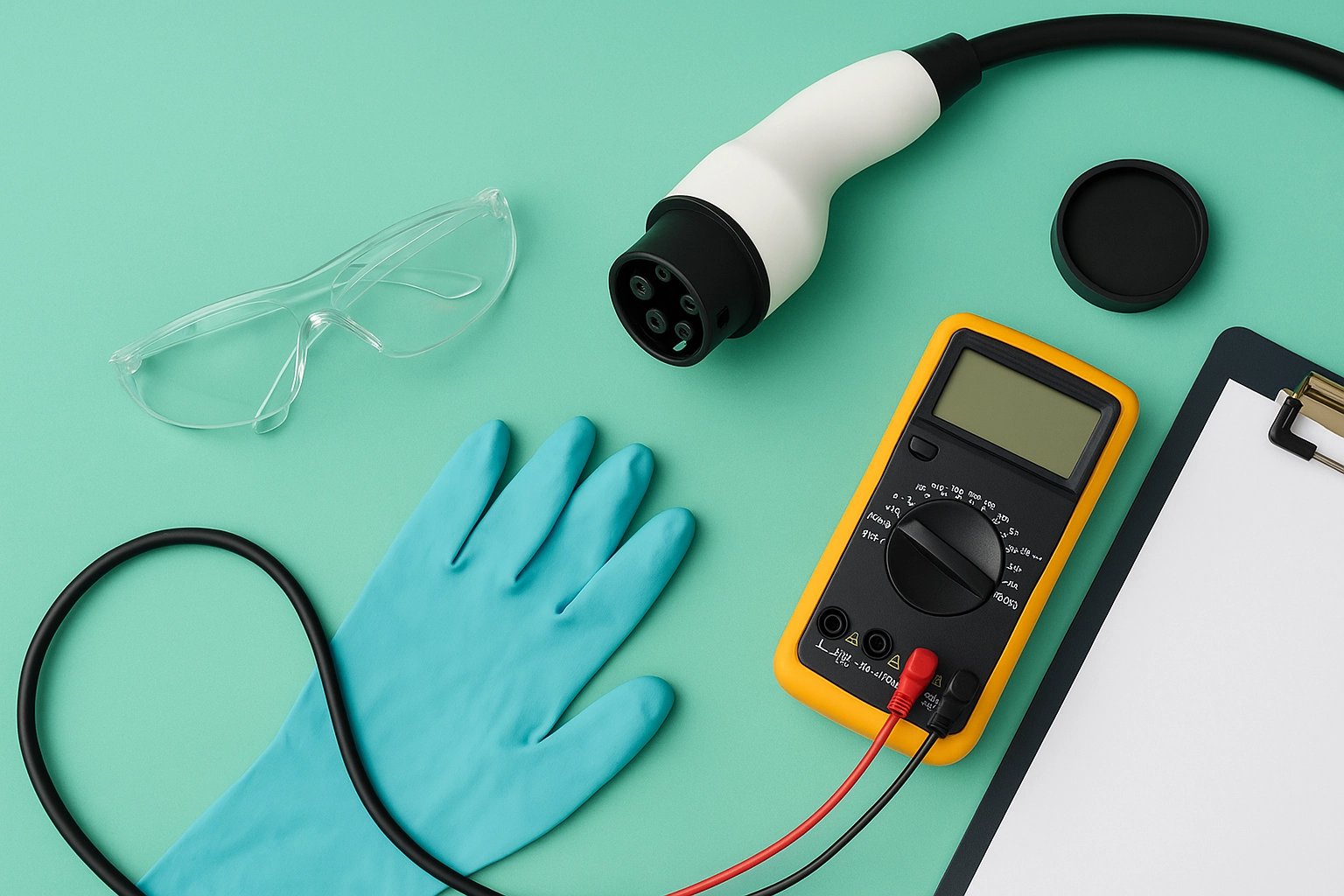SAE J3271 High Power Charging System Test
The SAE J3271 standard establishes a rigorous framework for testing high-power charging systems, ensuring they meet stringent performance and safety criteria. This test is pivotal in the automotive industry as it evaluates the durability, reliability, and efficiency of electric vehicle (EV) charging equipment under real-world conditions.
The SAE J3271 protocol focuses on verifying that the charging system can withstand high-power outputs without compromising its integrity or performance. This includes assessing the charging controller's ability to handle peak power demands, ensuring compatibility with various EV models, and confirming the safety of the charging process. The test also evaluates the efficiency of energy transfer between the charger and the vehicle, which is crucial for reducing charging time and enhancing user experience.
One of the key aspects of this testing procedure is the use of standardized connectors and cables that are compatible with multiple EV models. This ensures interoperability across different makes and models, promoting a seamless charging experience for users. The test also includes performance under varying environmental conditions, such as temperature extremes, which can significantly impact the efficiency and lifespan of the charging system.
Additionally, SAE J3271 emphasizes the importance of safety features in high-power charging systems, including overcurrent protection, voltage regulation, and fault detection. These features are critical for preventing damage to both the vehicle and the charger itself, as well as ensuring the safety of users during the charging process.
The testing protocol involves subjecting the charging system to a series of stress tests designed to simulate real-world usage scenarios. This includes prolonged high-power charging sessions, rapid charging sequences, and repeated cycles of charging and discharging. By simulating these conditions, the test provides valuable insights into the long-term performance and durability of the charging equipment.
Furthermore, SAE J3271 testing ensures compliance with international standards, which is essential for manufacturers looking to enter global markets. Compliance with such standards not only enhances the reputation of a company but also facilitates easier market access in countries that require conformity assessments or certifications based on these standards.
Why It Matters
The SAE J3271 test is crucial for several reasons. Firstly, it ensures that charging systems are reliable and safe, which is paramount in the EV sector where safety is a top priority. By adhering to this standard, manufacturers can provide users with confidence that their equipment will perform consistently and safely over time.
Secondly, compliance with SAE J3271 helps establish interoperability across different EV models and charging networks. This interoperability is essential for the widespread adoption of electric vehicles, as it allows users to charge their vehicles wherever they go without compatibility issues.
Thirdly, this testing ensures that high-power charging systems are efficient in energy transfer, which directly impacts user experience and satisfaction. Efficient systems mean faster charging times, reduced downtime, and lower operational costs for both manufacturers and operators of charging stations.
Finally, SAE J3271 testing plays a vital role in promoting sustainability by ensuring that EV charging infrastructure is built to last. This long-term durability not only reduces the environmental impact of production but also supports the overall goal of reducing carbon emissions from transportation.
Why Choose This Test
- Ensures Compliance with International Standards: Adherence to SAE J3271 ensures that your charging system meets the highest industry standards, facilitating easier market entry and compliance.
- Rigorous Testing Protocol: The test protocol is designed to simulate real-world conditions, providing valuable insights into long-term performance and durability.
- Interoperability: By ensuring compatibility with multiple EV models, SAE J3271 promotes seamless charging experiences for users across different makes and models.
- Safety Features: The test focuses on verifying critical safety features such as overcurrent protection and fault detection, ensuring a safe charging environment.
- Efficiency Evaluation: SAE J3271 evaluates the efficiency of energy transfer between the charger and the vehicle, which is crucial for enhancing user experience and reducing operational costs.
Quality and Reliability Assurance
Ensuring quality and reliability in high-power charging systems is a multi-faceted process that involves meticulous planning, execution, and validation. The SAE J3271 test plays a pivotal role in this process by providing a comprehensive framework for evaluating the performance of charging equipment.
- Component Testing: Each component of the charging system is tested individually to ensure it meets the specified standards and performs as expected. This includes the charger, cables, connectors, and associated electronics.
- System Integration: Once individual components are validated, they are integrated into a complete system for further testing. This ensures that all parts work harmoniously together under real-world conditions.
- Stress Testing: The system is subjected to various stress tests, including prolonged high-power charging sessions and rapid charging sequences. These tests push the equipment beyond normal operating parameters to identify potential weaknesses or failures.
- Data Analysis: Extensive data is collected during testing, which is then analyzed using advanced software tools. This analysis provides detailed insights into the performance of the system under different conditions.





